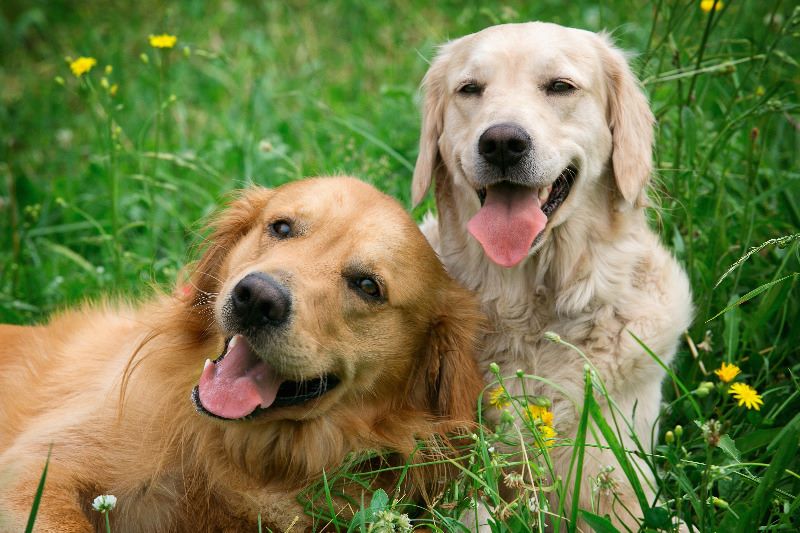
Can dogs eat nuts? Nuts are packed with nutrients that are an essential part of our diets. However, our bodies are quite different from our furry friends. Even though we love to share a snack or two with our pups, it is essential to know which nuts are okay and which have the potential to harm them.
Are Nuts Bad for Dogs?
The only truly toxic nut to dogs is the macadamia nut, but nuts can pose a variety of other risks. For example, many types of nuts can grow molds or other toxins that can be a concern for dogs. Mycotoxins are a concern for walnuts, pecans and a few others like almonds. Peanuts can also get moldy and grow an aflatoxin that is toxic to dogs, so be sure to only serve fresh nuts to your dog.
Symptoms of toxin ingestion from eating nuts include:
- Tremors
- Seizures
- Abdominal pain
- Vomiting
- Excessive salivation
In addition, most nuts contain high-fat levels and tend to be covered in salt. Increased fat levels can lead to obesity and pancreatic issues for your dog, and salted nuts can lead to water retention. Additionally, some nuts can pose a potential choking hazard.
Read on to learn about individual nuts.

Can Dogs Eat Almonds?
No. Dogs should not eat almonds. Almonds are a choking hazard for dogs and can block their esophagus or intestines.
Other side effects of almonds include:
- Gas
- Loss of appetite
- Discomfort
- Vomiting
- Lethargy
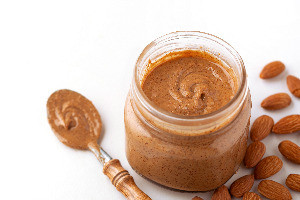
Can Dogs Eat Almond Butter?
While a whole almond might not be safe for your furball, almond butter IS a safe and healthy alternative. Almond butter contains vitamin E, vitamin B, manganese, and zinc, so it is a healthy and tasty supplement for your dog in small doses. Before giving your dog a small bite of almond butter, peanut butter, or any other human treat, MAKE SURE the butter doesn’t contain xylitol which your dog should not consume.
What is xylitol? Xylitol is a sugar substitute which affects humans and dogs differently. Although xylitol doesn’t cause an insulin release in humans, it can in dogs. The release of insulin can be so rapid that it can cause a quick and dramatic drop in blood sugar levels, known as hypoglycemia, which can be fatal. Always check your peanut butter for xylitol.
Can Dogs Eat Peanuts?
Your dog can have peanuts as long as they are fresh, unsalted, dry-roasted, raw peanuts! This form of peanut is an excellent source of protein, vitamin E, and manganese. This type of peanut can also promote skin and coat health, brain and heart health, and proper blood flow.
Just be sure you only serve your dog peanuts in small proportions; the high amount of sodium in peanuts can be unhealthy if consumed in large quantities. It is also important to note that raw peanuts can be a choking hazard, so make sure you break them up before feeding them to your pup. Finally, only serve up fresh peanuts; if old peanuts get moldy, the mold can grow an aflatoxin that is toxic to dogs.
Fun fact: Peanuts are actually part of the legume (bean) family and aren’t nuts at all!
Can Dogs Eat Peanut Butter?
Since dogs can have small amounts of peanuts, they can also have small amounts of peanut butter. This tasty treat is a wonderful reward for our canine friends. As with almond butter, MAKE SURE your almond butter does not contain xylitol.
What Peanut Butter is Safe for Dogs?
In addition to absolutely having no xylitol, the best peanut butter for your dog is peanut butter that doesn’t contain:
- Sugar
- Salt
- Seasonings
Try raw peanut butter like Buddy Butter, for a safe treat for your pup!
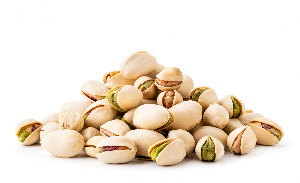
Can Dogs Eat Pistachios?
No.There are just too many risks involved with serving your dog pistachios, including:
- Obesity
Gastrointestinal disorders
Pancreatitis
Intestinal blockage
Vomiting
Moldy toxins (mycotoxins) from older pistachios
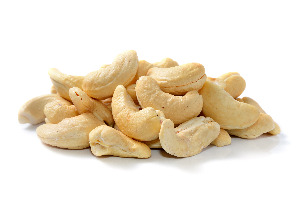
Can Dogs Eat Cashews?
Cashews aren’t the healthiest nut of choice but they are non-toxic to dogs. They are high in fat and protein, so you shouldn’t give your dog too many at once, or too often. Like almonds, they can pose a choking hazard, so make sure to break them up in small pieces before feeding them to your furry friend.
Cashews do, however, contain some healthy nutrients, which can help manage cellular health, skin and coat health, and muscle tissue development. These nutrients include:
- Antioxidants
- Omega-3 fatty acids
- Vitamins C and K
- Magnesium
- Phosphorus

Can Dogs Eat Walnuts?
No. Walnuts are particularly susceptible to carrying mold, which is a breeding ground for mycotoxins. Walnuts (especially black walnuts) can also be very hard to digest and can cause internal blockages. For all these reasons, it is best to keep walnuts way out of your furry friends’ reach.
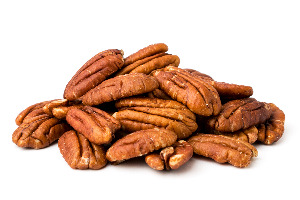
Can Dogs Eat Pecans?
No. Like walnuts, pecans are not safe for your dog as they too are susceptible to the growth of hazardous mycotoxins. Make sure pecans are also far out of reach from your dog.

Can Dogs Eat Macadamia Nuts?
No. Roasted or raw, macadamia nuts are toxic to dogs. Signs your dog may have macadamia nut poisoning include:
- Back leg weakness
- Vomiting
- Diarrhea
- Gastrointestinal problems
Tips for Safely Feeding Your Dog Nuts

Limiting the portion size of permissible nuts you feed your dog is essential. You should also ensure that the nut does not have any seasoning, including salt, and does not have a shell. Remember to check nuts for any mold or fungus before feeding them to your dog.
While some nuts are safe for your dog in small amounts, if you do not feel confident about the safety or dosage of various nuts, talk to your veterinarian. You may decide that for you or your family, the best practice is to avoid giving nuts to your dog. In that case, you might turn to the many other healthy treats your dog can have that do not pose any risks at all. Consider feeding your dog safe fruits or vegetables as a tasty treat.
Healthy snack alternatives include:
- Blueberries
- Bananas
- Pumpkin
- Carrots
Symptoms of Nut Toxicity in Dogs
If you notice any of the following symptoms, take your dog to the vet immediately:
- Vomiting
- Fever
- Lack of poop for a couple of days
- Bloating
- Fever
- Rapid heart rate
- Abdominal pain (groaning, rapid breathing, touch avoidance)
- Loss of appetite
- Weakness
- Tremors
- Difficulty walking or weakness in legs
- Seizures
- Bloody stool – may appear black
- Orange colored urine
Here at Harmony Animal Hospital, we are happy to help answer any questions you have about your dog’s diet. You can contact us at (919) 303-3456. For emergency services, visit this list of emergency vets in the Raleigh/Durham area.

